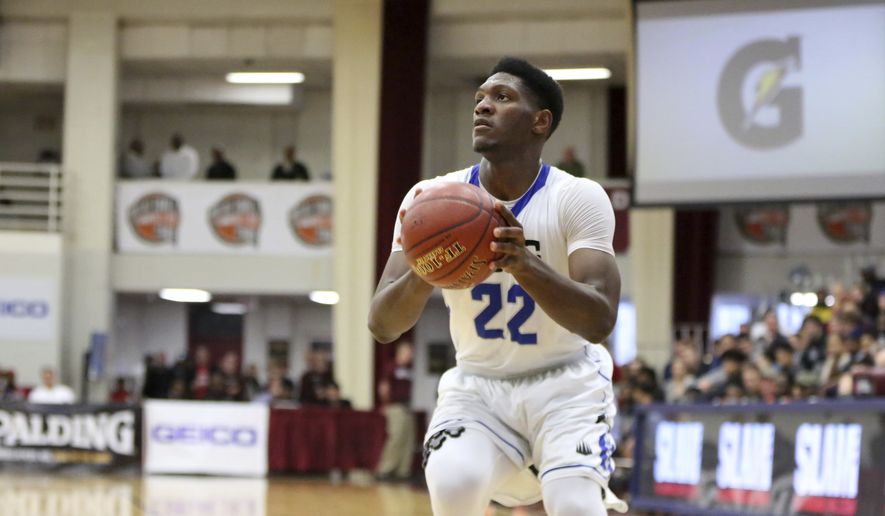NCAA amateurism policies are the real federal fraud case

By DERON SNYDER (as published in The Washington Times)
The FBI calls them “bribes.”
I prefer to call them “signing bonuses.”
Those discrepant views just might determine your stance on what happens in college basketball. But none of us should ever confuse NCAA violations for federal crimes.
Adidas, Nike and Under Armour understand the distinction. So do players, their families, college coaches, and grass-roots basketball organizers. Their secret economy is an attempt to compensate for unjust NCAA policies that perpetuate the sham of amateurism.
Yet, here we are, forced to endure the charade as federal prosecutors put recruiting tactics on trial in New York, where the first of three cases off an FBI probe of college basketball’s so-called underbelly has begun. James Gatto, a former high-ranking Adidas executive, is first up, charged with two counts of wire fraud and conspiracy to commit wire fraud.
But the real fraud is wasting our tax money on what’s essentially a matter between the NCAA and its member institutions.
The NCAA says amateur athletes (who play basketball and football) can’t accept anything – not a dollar, a drink or a donut – without the risk of losing their collegiate eligibility. Um, sure, OK. But that doesn’t mean the FBI should make a Bunyanesque leap in correlating offenses with felonies.
Talk about your victimless “crime.” College basketball wouldn’t look much different if the NCAA changed its position. Imagine if the suits gave up their immoral low ground and told prospective athletes: “Look, anything goes now. Get whatever you can get for your talent. Best wishes.”
The cream of the crop would still flock to high-profile powerhouses like Kentucky, Duke and Kansas. Programs with a perennial presence in the Top 25 would keep their status. The structure of high majors, low majors, high mid-majors and low mid-majors would remain intact.
Life as we know it – in college hoops and otherwise – would go on.
But, no. The NCAA wants to enforce its antiquated rules and the FBI wants to make them a federal case. Even worse, government prosecutors are doing their best to shield schools from damage, when schools are as guilty as anyone.
Among the prosecution’s motions is one that would limit what defense attorneys can say about past infractions at Kanas, Louisville, Miami and North Carolina State, the schools mentioned in the indictment. For instance, bringing up the stripper parties at Louisville and Nevin Shapiro’s pay-for-play scheme at Miami would be restricted.
Likewise, the feds want to prohibit the defense from discussing schools not mentioned in the indictment, say, USC for its troubles with Reggie Bush and O.J. Mayo.
“In sum, evidence or cross-examination regarding prior violations of the NCAA rules by universities who are not alleged to be victims is of little to no probative value,” U.S. attorneys wrote in their motion, “and allowing such topics to be explored would confuse the issues and mislead the jury.”
Actually, bringing the case to trail confuses the issues and misleads the jury.
Gatto’s attorney said her client, on Louisville’s behalf, agreed to pay $100,000 to a top recruit’s family because that’s what it took to beat out Nike and Oregon. Casey Donnelly said Gatto wasn’t trying to defraud Adidas-sponsored schools, just make sure they won recruiting battles.
“Jim was not trying to hurt these universities, he was trying to help them,” Donnelly said, according to The Washington Post. “He thought he was doing his job.”
He was trying to level the playing field, which isn’t to say $100,000 is the play for every level. That’s what it was Brian Bowen. The defense said it was $20,000, from Under Armour, to steer Silvio De Sousa to Maryland, and $150,000, from Nike, to push Nassir Little toward Arizona.
Wow, look at that. Free-market economics work even under the table!
In May 2017, for the fourth time in his tenure as Rhode Island’s men’s basketball coach, Danny Hurley signed a contract extension, this one taking him through the 2023-24 season. But in May 2018, he signed a six-year contract to become Connecticut’s coach.
In addition to tripling his salary, Hurley’s deal with the Huskies included typical coaches’ perks like moving expenses, a country club membership, a car allowance, etc. But that’s nothing compared to some of Dabo Swinney’s permissible benefits as Clemson’s football coach.
According to a report he filed on his outside income, Swinney last season was deeded a brand-new condo worth at least $250,000. The real estate developer who built the property told USA Today that Swinney was given the unit in exchange for endorsing a hotel the developer owned.
Swinney’s deal wasn’t a bribe, just business.
It’s a shame that the NCAA’s awful policies on “shamateruism” limit such practices to management and not the help.
That’s what ought to be a federal case.
— Brooklyn-born and Howard-educated, Deron Snyder writes his award-winning column for The Washington Times on Tuesdays and Thursdays. Follow him on Twitter @DeronSnyder.
 Follow
Follow
